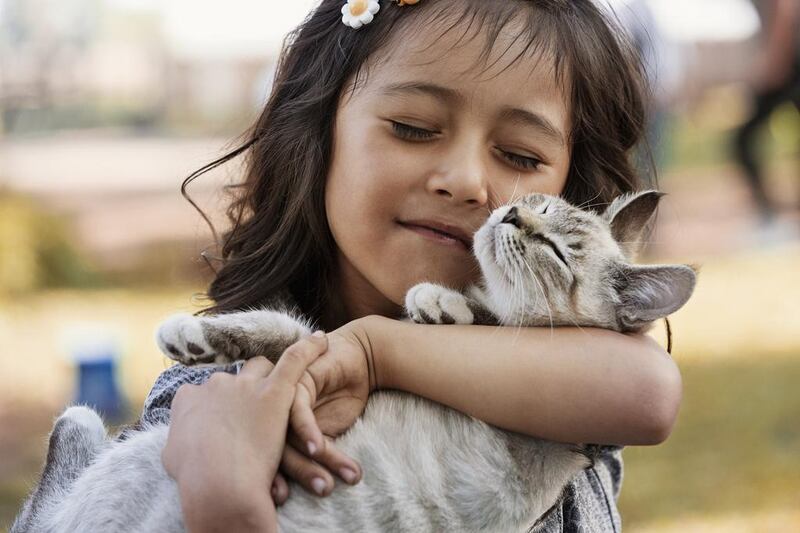Almost every weekend, little Tuna, a tabby kitty, gets a special visitor. Noura, a seven-year-old girl, likes to sit with Tuna, and talk to her for hours about her latest adventures. From a distance, they look like any cute child and cat. On a closer look, one can see the fatigue and the fragility of the two little ones.
The two have cancer, very different kinds, but of the relentless vicious kind.
And despite some warnings from specialists to be careful around animals due to weakened immunity, Noura’s mother has seen how happy her little girl is around Tuna, and how she communicates her fears and her hopes to the cat much more than she does to her family.
“We are not going to let cancer win, OK?” Noura says to Tuna, repeating what her mother has said to her whenever days were extra tough. While Noura is getting the best treatment available here in the UAE, there isn’t anything that can be done for Tuna, because of the lack of proper cancer-related facilities for animals.
Today, animals barely have their basic rights respected, but that shouldn’t prevent us from pushing for proper medical facilities for them.
Animals can get cancer just like us: from breast cancer to skin cancer and sadly, often for them, there is no means to help them.
For instance, there are no proper radiation facilities in the UAE for pets with cancer, although some chemotherapy is available. So caretakers of their beloved pets, who are loved as a member of the family, have to travel to Europe or the United States for treatment, and you can imagine how difficult that can be, as air travel for pets is risky and difficult.As a nation that has been a pioneer in many fields, why can’t the UAE be the first Arab nation with a full-scale cancer hospital for animals? It can have a research element to it, where it can improve on medicines for animals — some are so painful due to lack of funding to improve upon them.
All the pet lovers from around the region would come here for treatment as no one who truly loves their pet should be forced to put down their pet due to lack of options.
And looking back at this region’s history, having hospitals dedicated to animals and birds is actually nothing new. Looking through archival data from the region, particularly the Ottoman Empire, one is in awe of some of the information that emerges.
One discovers that the world’s first animal hospital was built sometime in the 19th century Bursa, Turkey, to look after the storks and migrating birds and was named “Gurabahane-I Laklakan” which translates as the “Helpless Stork House”. It slowly transformed into a proper animal hospital that took care of all kinds of disabled and sick creatures, from blind owls to sick cats to limping donkeys.
And what is more surprising is that the treatments were free, with the governing body then paying for the sustainability of the treatments, the staff and facility. The number of laws that were around then for the provision of animals and even trees was astounding.
Contrary to conventional wisdom asserting that animal welfare is a relatively new concept for the rest of the world, there were several accounts of similar clinic-like settings in 17th-century Damascus, where sick cats and dogs were taken care of.
Throughout the Islamic empire there were efforts made for animals, like water basins being set up around the mosques, which were designed specifically for birds and animals to drink from.
With all the other issues in the region, from refugees to orphans, animals and their plight are not a priority. However, their struggles should also not be forgotten. Noura wants her friend Tuna to have a fighting chance, in spite of how little she is.
rghazal@thenational.ae
On Twitter: @arabianmau





